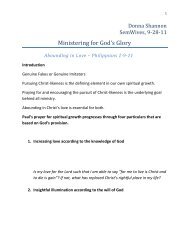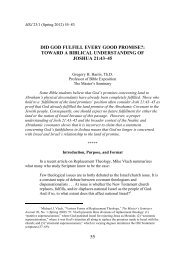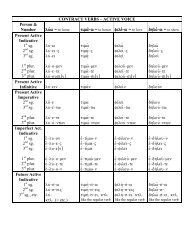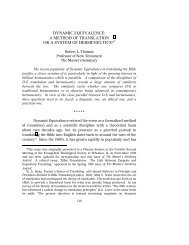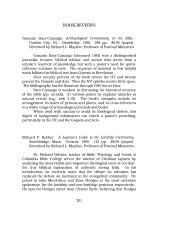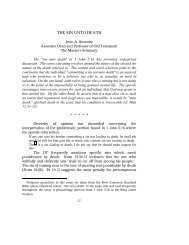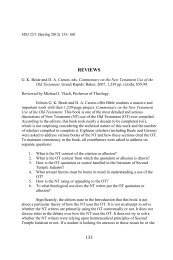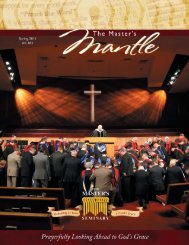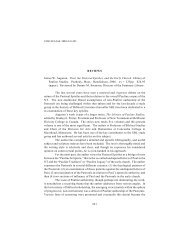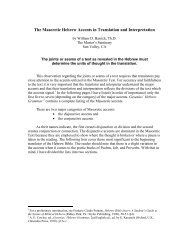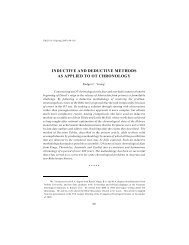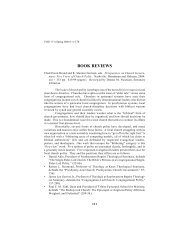The Dispensational View of the Davidic Kingdom - The Master's ...
The Dispensational View of the Davidic Kingdom - The Master's ...
The Dispensational View of the Davidic Kingdom - The Master's ...
Create successful ePaper yourself
Turn your PDF publications into a flip-book with our unique Google optimized e-Paper software.
<strong>Dispensational</strong> <strong>View</strong> <strong>of</strong> <strong>the</strong> <strong>Davidic</strong> <strong>Kingdom</strong> 221edition serve as a reference point for classic dispensationalism, but <strong>the</strong>revision in 1967 (from which he derives <strong>the</strong> nomenclature "reviseddispensationalism") <strong>of</strong>fers "views much more compatible to writers <strong>of</strong>this second period [revised stage]." 30 However, though revisions <strong>of</strong>minor points occurred, <strong>the</strong> major structures and many <strong>of</strong> <strong>the</strong> key texts,especially texts <strong>of</strong> interest to this present discussion, remain intact. 31<strong>The</strong> extensive note on Acts 1:11, which is <strong>the</strong> same in <strong>the</strong> original andrevised editions, serves as an example <strong>of</strong> <strong>the</strong> many that substantiatethis point. Here Sc<strong>of</strong>ield wrote <strong>of</strong> <strong>the</strong> two advents, "In due time <strong>the</strong>Messiah born <strong>of</strong> a virgin according to Isaiah's prophecy (7:14),appeared among men and began His ministry by announcing <strong>the</strong>predicted kingdom as `near' (Mt 4:17, note 9). <strong>The</strong> rejection <strong>of</strong> Kingand kingdom followed." 32 In <strong>the</strong> same note he added that <strong>the</strong> NTteaching <strong>of</strong> <strong>the</strong> return <strong>of</strong> Christ has <strong>the</strong> following relation to Israel:"<strong>The</strong> return <strong>of</strong> <strong>the</strong> Lord to <strong>the</strong> earth is to accomplish <strong>the</strong> yet unfulfilledprophecies <strong>of</strong> Israel's national rega<strong>the</strong>ring, conversion, andestablishment in peace and power under <strong>the</strong> <strong>Davidic</strong> Covenant (2 Sam.7:16, note; cp. Acts 15:14-17 with Zech. 14:1-9)."Chafer picked up <strong>the</strong>se same emphases:Every Old Testament prophecy <strong>of</strong> <strong>the</strong> kingdom anticipates Hiskingly <strong>of</strong>fice: (a) Christ will yet sit on <strong>the</strong> <strong>Davidic</strong> throne asDavid's heir (2 Sam. 7:16; Ps. 89:20-37; Isa. 11:1-16; Jer. 33:19-21).(b) He came as a King (Luke 1:32-33). (c) He was rejected as a King(Mark 15:12-13; Luke 19:14; cf. Gen. 37:8; Ex. 2:14). (d) When Hein Modern American Culture [Cambridge, Mass.: Belknap, Harvard University Press,1992] 98).30Blaising and Bock, Progressive <strong>Dispensational</strong>ism 22.31One such revision concerns <strong>the</strong> infamous note on John 1:17; see <strong>the</strong> discussion inFred H. Klooster, "<strong>The</strong> Biblical Method <strong>of</strong> Salvation: A Case for Continuity,"Continuity and Discontinuity, John Feinberg, ed. (Westchester, Ill: Crossway Books,1988) 133. In addition, <strong>the</strong> editors have s<strong>of</strong>tened <strong>the</strong> language relating to <strong>the</strong>kingdom <strong>of</strong> heaven and kingdom <strong>of</strong> God distinction (cf. note on Matt. 3:2). However,<strong>the</strong> notes on key texts concerning <strong>the</strong> kingdom, <strong>the</strong> church, and eschatology remainsubstantially intact (cf. various notes on Matt. 13, Acts 1, and throughout Revelation).32Sc<strong>of</strong>ield, Sc<strong>of</strong>ield Reference Bible, note on Acts 1:11.



